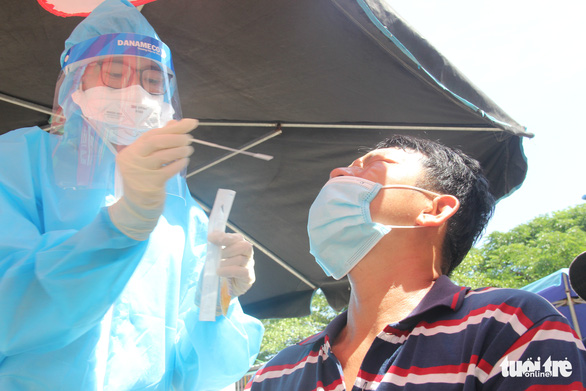People testing positive for the coronavirus but having no symptoms and under quarantine should take online jobs or act as caretakers of other COVID-19 patients at home, other accommodations or treatment facilities, if they volunteer to do so, Vietnam’s Ministry of Health has proposed.
When symptomless patients work as caretakers, they must strictly comply with all safety measures, the ministry said.
The agency also recommended that close contacts of COVID-19 patients, whether they have got vaccinated or not, can work directly or online, and when they engage in direct jobs, employers must arrange separate working areas for them.
Direct contacts should have their health monitored for 10 days and be put under home quarantine for five days if they have been fully vaccinated.
People who have yet to be fully immunized will be subject to a quarantine period of seven days.
On the fifth day of their 10-day health monitoring period, people are to be required to undergo COVID-19 testing and if they get a negative result, they will be further monitored until the end of the period, provided they do not come in contact with high-risk groups, including people aged over 50, pregnant women, and those with underlying conditions, the ministry said.
Vietnam has reported over four million COVID-19 cases, including 1.5 million cases under treatment, but the number of critical patients has declined significantly, the ministry said.
Currently, 95 percent of the COVID-19 patients under treatment in Hanoi, which has recently taken the lead in daily infections nationwide, have mild or no symptoms.
The ministry’s proposal has received consent from many epidemiologists, including Dr. Le Thi Anh Thu, president of the Vietnam Association for Infection Control.
Given the current epidemic situation, in which the number of positive cases is very high, it is appropriate to allow direct contacts of COVID-19 patients to do in-person jobs, provided they meet all safety requirements, Dr. Thu said.
"Every coronavirus patient can have a lot of direct contacts, so if we continue putting direct contacts in home quarantine, our country’s economy will certainly suffer manpower shortage,” Thu explained.
Another epidemiologist said that employing direct contacts should be applied flexibly depending on practical conditions in each locality.
Kim Chi, a garment worker in District 7, Ho Chi Minh City, said she has taken sick leave as a direct contact of COVID-19 patients.
“One after another worker on the same production line has tested positive for the coronavirus and I have had to self-isolate at home many times without any symptom, so my income has been shrinking,” Chi said.
“It is reasonable to allow such direct contacts to continue working."
Vietnam, with a population of around 98 million people, has documented 4,232,520 COVID-19 cases, with 2,616,002 recoveries and 40,726 fatalities since the pandemic hit the country in early 2020, the Ministry of Health reported.
Health workers have administered 180,261,337 vaccine doses to people aged 18 and older nationwide since the vaccination campaign rolled out in March 2020.
Of these doses, 70,850,523 were the first shots, 67,633,117 the second jabs, and the rest the third doses, including additional primary shots and boosters.
The numbers of first and second vaccine doses administered to children aged 12 to 17 were 8,741,641 and 8,274,939, respectively, the ministry said.
Like us on Facebook or follow us on Twitter to get the latest news about Vietnam!





















































